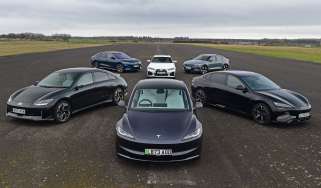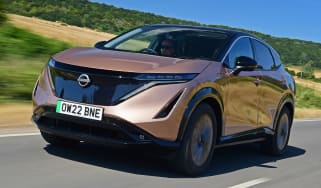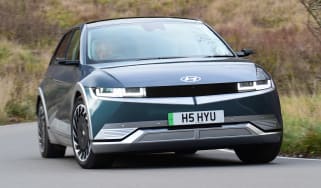How much is company car tax on electric cars?
The UK’s million or so company car users pay two per cent Benefit-in-Kind tax if they have an electric car in the 2022/23 financial year

Full electric cars are exempt from Vehicle Excise Duty (VED) until 2025, but you still have to pay Benefit-in-Kind (BiK) tax if you’re going to run one as a company car.
Going back to the 2020/21 financial year, the BiK rate for zero-emissions company cars was set at 0 per cent by the government, but today there's a two per cent charge for all electric cars. This BiK company car tax rate for EVs will stay fixed at two per cent for the 2023/24 and 2024/25 tax years, too.
How does company-car tax work on electric vehicles?
There are two parts to company car tax – what the company pays and what the employee pays – and the amounts depend on the car’s value, its CO2 emissions and the income-tax bracket of the employee.
The amount the company has to pay is determined by the car’s ‘P11D’ value (the value of the car including VAT, options and the delivery fee) and its CO2 emissions.
By contrast, the amount that the employee has to pay is slightly more complicated, and is calculated using the following formula: (P11D value) x (BiK band) x (tax bracket).
For example, a Nissan Leaf 39kWh in Acenta trim has a P11D value of £28,940 and its BiK band for 2022/23 is two per cent. So, if you’re a 20 per cent taxpayer, you’ll pay £115.76p in BiK tax, whereas a 40 per cent earner will pay £231.52p in the same period.
Will the BiK rate for fully electric cars change?
As you saw above, the key to BiK tax is the BiK band. The government sets this, and it is two per cent for all fully electric cars in the 2022/23 tax year.
As recently as 2020/21, the BiK rate was 0 per cent, then in 2021/22 it went up to one per cent. For 2022/23 the rate is two per cent and it has been confirmed that this will be fixed at least until the end of the 2024/25 tax year. It means that an electric company car will continue to be a very affordable pick.
Beyond that, rates have not been confirmed, although they’re likely to creep up in the longer term as more and more electric cars join company-car fleets and the government needs to maintain tax revenues.
Is the BiK rate different for PHEVs and hybrids?
Plug-in and other hybrids also incur BiK tax, calculated in a similar way as above. From the 2020/21 financial year onward, the cost has depended on how far they can be driven in electric mode, as well as their CO2 emissions.
If a plug-in hybrid company car with CO2 emissions of between 1 and 50g/km can cover less than 30 miles in electric only mode it's subject to a 14 per cent BiK tax band. If it can cover between 30 and 39 miles on electric power alone; their drivers pay BiK at 12 per cent. Those that can go even further see the rate fall, with 40-69 miles bringing an eight per cent band, 70-129 miles bringing five per cent and over 130 miles meaning a two per cent charge - although no current plug-in hybrid can go much over 80 miles in EV mode.
Either way, these prices are far less than the 20 per cent-or-more rates that tend to apply to petrol and diesel cars.
BiK company car tax bands (until 2024/25)
| CO2 emissions g/km | Electric mileage range | NEDC % | WLTP % |
|---|---|---|---|
| 0 | — | 2 | 2 |
| 1 to 50 | 130 and above | 2 | 2 |
| 1 to 50 | 70 to 129 | 5 | 5 |
| 1 to 50 | 40 to 69 | 8 | 8 |
| 1 to 50 | 30 to 39 | 12 | 12 |
| 1 to 50 | less than 30 | 14 | 14 |
| 51 to 54 | — | 15 | 15 |
| 55 to 59 | — | 16 | 16 |
| 60 to 64 | — | 17 | 17 |
| 65 to 69 | — | 18 | 18 |
| 70 to 74 | — | 19 | 19 |
| 75 to 79 | — | 20 | 20 |
| 80 to 84 | — | 21 | 21 |
| 85 to 89 | — | 22 | 22 |
| 90 to 94 | — | 23 | 23 |
| 95 to 99 | — | 24 | 24 |
| 100 to 104 | — | 25 | 25 |
| 105 to 109 | — | 26 | 26 |
| 110 to 114 | — | 27 | 27 |
| 115 to 119 | — | 28 | 28 |
| 120 to 124 | — | 29 | 29 |
| 125 to 129 | — | 30 | 30 |
| 130 to 134 | — | 31 | 31 |
| 135 to 139 | — | 32 | 32 |
| 140 to 144 | — | 33 | 33 |
| 145 to 149 | — | 34 | 34 |
| 150 to 154 | — | 35 | 35 |
| 155 to 159 | — | 36 | 36 |
| 160 to 164 | — | 37 | 37 |
| 165 to 169 | — | 37 | 37 |
| 170 and above | — | 37 | 37 |
Are vans liable for company-car tax?
If your company gives you a van for private use, you’ll pay a ‘van benefit charge’ instead of company-car tax. This is £3,500 for normal vans, but employees pay no BiK tax on an electric van.
Now here's our pick of the best company cars to choose today...







